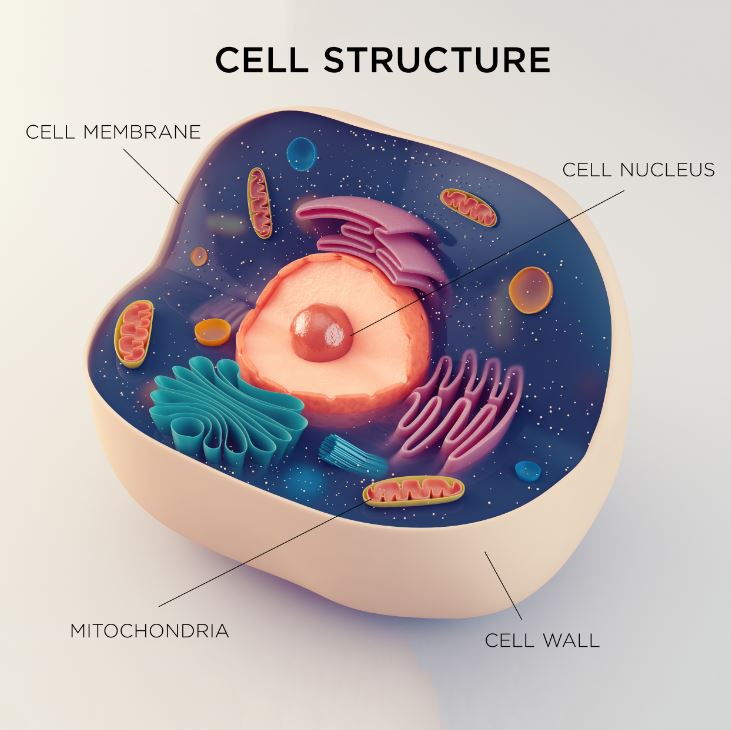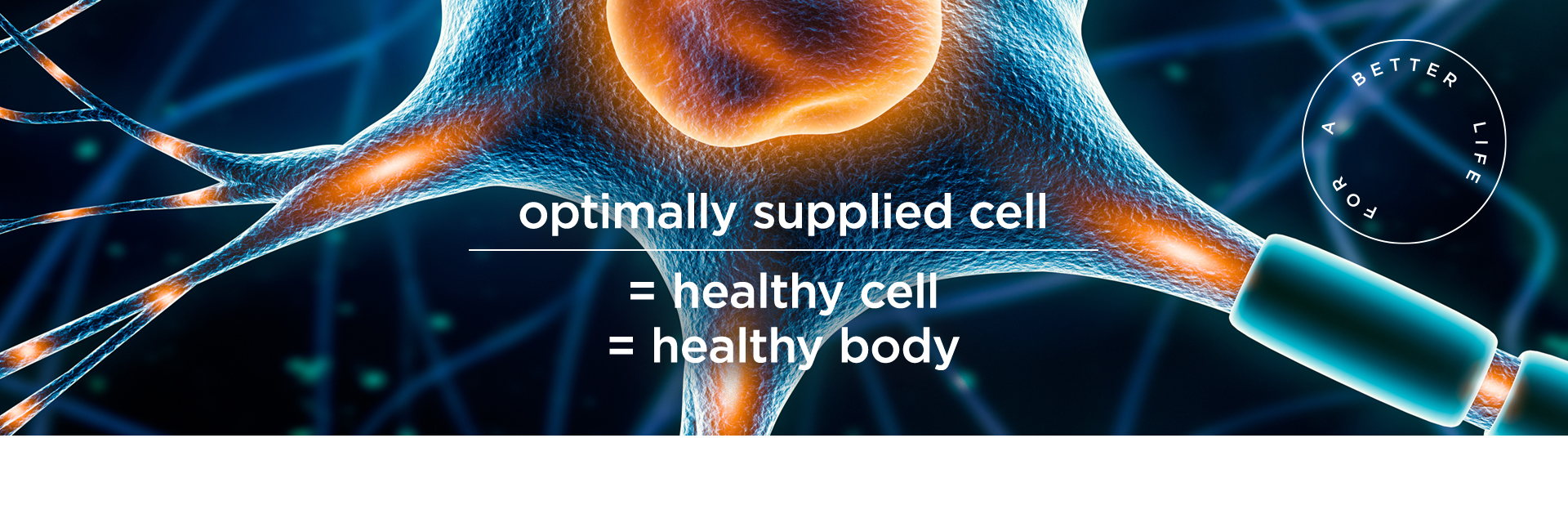The organism is constantly renewing itself – and the better the cells are doing, the more effectively they do so. In addition to macronutrients such as proteins, carbohydrates and fats, we also need micronutrients. Much smaller quantities of these will do, but that doesn’t make them any less important – on the contrary. Vitamins, minerals, trace elements and secondary plant compounds are indispensable for the billions of biochemical processes that take place in our bodies every second.
Good nutrition is the basis of our health.
To understand this, let’s venture a look at our smallest unit: the cell.
The basis of our health
Each of our cells is a small marvel in which thousands of chemical and electrical processes are constantly taking place. In order to function optimally, the cells need sufficient tools – i.e. nutrients such as vitamins, minerals, trace elements and so-called secondary plant substances. High quality raw materials in the right composition give our body exactly what the cells need to work optimally. It is the right combination of micronutrients that makes it so that their positive interactions can be potentiated. In short: the optimal performance of our body starts with the best possible supply of the smallest unit – the cell.
Cell facts
- Our body consists of about 70 trillion cells
- Every day, approx. 300 million cells die & are newly formed
- After 90 days, a large part of our body is renewed
- After 7 years almost every cell is renewed – also every bone
- Thousands of biochemical processes per second
- = healthier new cell formation
- 200 different types of cells in the human body
- The fuller the spectrum of nutrients, the better the cell works
Much new in 90 days
The quality of our lifestyle naturally influences the quality of the cell and thus its ability to function. One thing is clear: the changeover will take time. With any change in lifestyle and diet, optimally functioning cells do not form overnight. Therefore, the motto is: give your body time! Unlike medications, which have an immediate but selective effect, a change in diet takes a little time to produce a significant amount of smarter, better-functioning cells. But the patience (at least 3, better 6 months) is worth it! One then enjoys an honest and comprehensive effect that affects every area of the body.
Those who start to supply their cells with nutrients and stick to it for at least 3 to 6 months,
will notice a comprehensive effect on health and well-being.
The cell wall has two important functions: it serves the stability of the cell and keeps it in “shape” and protects the inner life of the cell from viruses, bacteria, fungi, and others.

Disease & premature aging originate in the cells
Our cells perform so many things in the body and have the most diverse tasks. Examples include skin formation and wound healing, or the transport of oxygen through the body. In addition, it kills pathogens such as heavy metals, toxins from spray residues or gene-mutated or irradiated food. If the cells can no longer cope with these countless challenges and an overload occurs, the consequences include inflammation, allergies and cardiovascular problems.
Today we are exposed to a lot of stress, and so is our body: oxidative stress is sometimes the cause of premature cell aging, which affects not only visible surface, but the whole body. To protect against these attacks, our body needs help from vital substances from nature. Secondary plant compounds such as isoflavones, resveratrol and xantone are true miracle weapons.
Vitamin A, B6, B12 and selenium contribute to the normal functioning and maintenance of the immune system.
Vitamin A and B12 contribute to the maintenance of vision.
Vitamin A and C as well as zinc, biotin, selenium and magnesium contribute to the maintenance of beautiful skin, hair & nails.
Vitamin C supports collagen formation for bone and cartilage function and helps maintain gums. Vitamin D also helps strengthen teeth and bones.
Muscle function is supported by vitamin D and magnesium. Proteins contribute to the building and maintenance of muscle mass.
Vitamin B1 contributes to the maintenance of normal heart function.
Vitamins B6 and B12 as well as zinc, folic acid and choline support hormonal activity.
Vitamin B2 and B12, as well as niacin, pantothenic acid and folic acid reduce fatigue.
Zinc supports cognitive function.
Vitamin E and B12 as well as zinc and selenium reduce oxidative stress.
Vitamin B1, B2, B6, B12 as well as niacin, pantothenic acid, bitotin and magnesium support energy metabolism and contribute to its maintenance.
Vitamins B1, B2, B6 and B12 as well as niacin and biotin contribute to the maintenance of the nervous system.
Vitamin B12, as well as niacin, biotin, folic acid and magnesium support mental function.
Zinc and chromium contribute to the support and maintenance of metabolism.
Folic acid contributes to blood formation.
Choline supports normal fat metabolism.
Choline contributes to the maintenance of liver function.
Chromium contributes to the maintenance of normal blood sugar levels.
